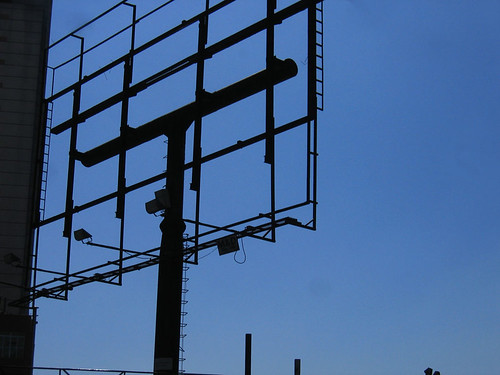
While Toronto looks to add more garish advertising to its street with a massive street furniture contract, Sà£o Paulo, Brazil has taken another route and gone ad-free. Back in Sept. 2006, the Spacing Wire first reported on these rumours, but now residents of the city of 11-million are seeing the results. The article from the International Herald Tribune gives a good overview, while photos on Flickr shows the transformation of the city’s visual landscape. From the IHT:
[T]his city of 11 million, overwhelmed by what the authorities call visual pollution, plans to press the “delete all” button and offer its residents unimpeded views of their surroundings.
But in proposing to transform the landscape, officials have unleashed debate and brought into conflict sharply differing concepts of what this city, South America’s largest and most prosperous, should be.
City planners, architects and environmental advocates have argued enthusiastically that the prohibition, through a new “clean city” law, brings Sà£o Paulo a welcome step closer to an imagined urban ideal.
The law is “a rare victory of the public interest over private, of order over disorder, aesthetics over ugliness, of cleanliness over trash,” Roberto Pompeu de Toledo, a columnist and author of a history of Sà£o Paulo, wrote in the weekly newsmagazine Veja. “For once in life, all that is accustomed to coming out on top in Brazil has lost.”
But advertising and business groups regard the legislation as injurious to society and an affront to their professions. They say that free expression will be inhibited, jobs will be lost and consumers will have less information on which to base purchasing decisions. They also argue that streets will be less safe at night with the loss of lighting from outdoor advertising.
“This is a radical law that damages the rules of a market economy and respect for the rule of law,” said Marcel Solimeo, chief economist of the Commercial Association of Sà£o Paulo, which has 32,000 members. “We live in a consumer society and the essence of capitalism is the availability of information about products.”
photos by Tony De Marco
PS: thanks to the 20-plus readers who forwarded us this story.

3 comments
That’s too cool, too bad TO would never do that, the backlash from people saying that the city is removing their sources of income would be huge. Though it would make the drive west-bound along along the Gardiner less distracting.
My favourite quote:
“They also argue that streets will be less safe at night with the loss of lighting from outdoor advertising.”
riiiiiiiiiiight, reaching a little far for that one
Marc, I thought exactly the same thing. Ads save lives!
I work for a small company and I participate in marketing it through booths at tradeshows and ads in magazines; after work I try to get billboards taken down. I don’t consider myself a hypocrite.
I think every business has a right to conduct some marketing, but it should be limited in scope and targeted. I feel the advertising I do for my company reaches people who will genuinely be helped by our product; our marketing is quiet, targeted, and does not seek to create a desire for our product where there is none. Most of the companies using billboards seem to be saying “I know you just bought the latest phone/car/jeans, but your life won’t be complete until you buy our new phone/car/jeans.” To be distributing this message over and over in the streets where people can’t choose to avoid it is at the least annoying; I would go so far as to say harmful.